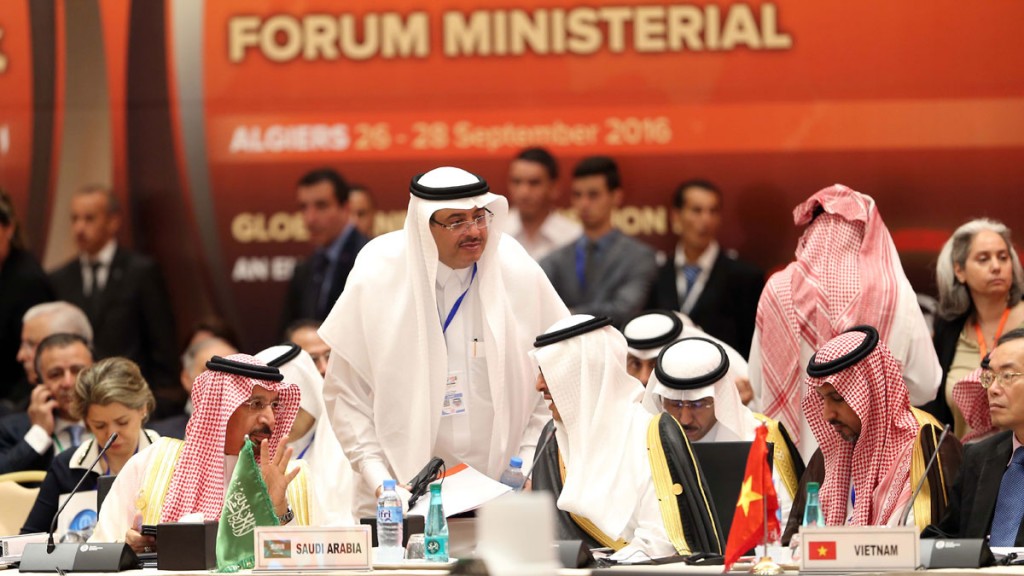
Oil cartel Opec is meeting in Algeria today.
All the talk in the lead-up has been about how the world’s oil producers (both Opec and big non-Opec players, such as Russia) can get together and push oil prices back up – or at least arrest the decline.
Hmm, let’s see here. You get Saudi Arabia and Iran in a room, throw in the odd heckle from the peanut gallery in the form of Venezuela and chums, and you expect them to co-operate?
Yes, it sounds far-fetched to me too…
Don’t expect any deal on oil production from Opec
Oil prices took a knock again yesterday. It looks as though the much-touted summit in Algeria isn’t going to produce any sort of deal that arrests the plunge in prices.
To cut a long story short, the idea was that producers might agree to a production freeze at current levels. That’s not such a big deal, because they’re pretty much all producing at near-record levels at the moment.
Yet they can’t even agree to that. Once again, it boils down to the rivalry between Saudi Arabia and Iran.
Saudi Arabia is burning through cash like there’s no tomorrow. The country has a whopping fiscal deficit of 13.5% – in other words, it is spending way more money than it takes in. That’s the biggest since 1991 and it’s all down to the collapse in oil prices. Until 2014, Saudi Arabia had some of the best government finances around. Not any more.
The government is slashing allowances and bonuses for state employees and cutting salaries. The austerity crackdown has hammered the stockmarket (apparently Saudi Arabia is now cheaper relative to other emerging markets than at any time since 2009), and the hotels sector in particular (lower pay and allowances means less spending on hospitality).
There’s only so long that this can continue for. Saudi Arabia’s original plan was to produce as much oil as possible to kill off its fracking rivals in the States. But that has taken longer than expected and it’s also not been entirely effective – some frackers are doomed, yes, but others have simply been driven to become even more efficient, which means their break-even costs are now lower than some Opec members.
So Saudi Arabia was apparently open to reducing its output if Iran agreed to freeze its production.
But it seems the answer is “no deal”.
Iran has only just been allowed back into the global oil market. It’s currently pumping around 3.6 million barrels a day, and it wants to pump more. You see, Iran isn’t feeling the pain from low oil prices as keenly as Saudi Arabia. Its economy is far less oil-dependent, partly because it’s been largely locked out of the market for so long.
So all it really cares about is making hay now the sun is shining again. It wants to restore its share of the world market to around 13%, which would be around 4.2 million barrels a day, equal to its 2012 level.
Now, there’s lots of politics involved here. Some experts reckon Saudi Arabia is making an offer that Iran was always going to refuse – that way it can blame Iran for not being co-operative.
But whatever the reasoning is, it looks as if we have to accept that oil prices are likely to be “lower for longer” – or certainly until the next official meeting at the end of November.
Low oil prices are good news for most of us
The big question is: what do lower-for-longer oil prices actually mean?
Markets have been very rattled by the drop in oil prices.
But once again, it’s worth pointing out that a collapse in the price of a resource that pretty much everyone uses is not a bad thing.
Low oil prices are bad news for producers – so oil companies, the fracking industry, and much of the Middle East. But they are good news for consumers – which is pretty much everyone else.
In terms of economies, obvious beneficiaries of a low oil price include India and Japan. And it’s good news for consumer-driven economies, like the US, the eurozone and the UK. If people have to spend less money filling up their cars, then they will spend more money at the shops, or on paying off debt.
For example, I was at an interesting conference on Europe’s woes held by Lombard Street Research and Trusted Sources yesterday where LSR’s Charles Dumas took a surprisingly upbeat view on eurozone growth prospects. He pointed out that the slide in oil prices had helped European consumers greatly.
Indeed, he expects the European Central Bank to be put in the position where it has to start “tapering” quantitative easing from the middle of next year, due to both growth and inflation starting to rise too rapidly for comfort.
(Incidentally, the conclusion of the conference remained that Europe still has massive problems, with the main one being Italy’s colossal debt problem – I’ll talk about that later this week.)
But my point is that we should enjoy low oil prices while we can. This is a genuine bolster to the economy – better than quantitative easing any day.
The only question is, what happens when the slide in oil prices starts to fall out of the inflation figures? What excuse will the Bank of England use then for failing to meet the inflation target? And what might the effect on government bonds be?
It won’t be pretty, that’s for sure.